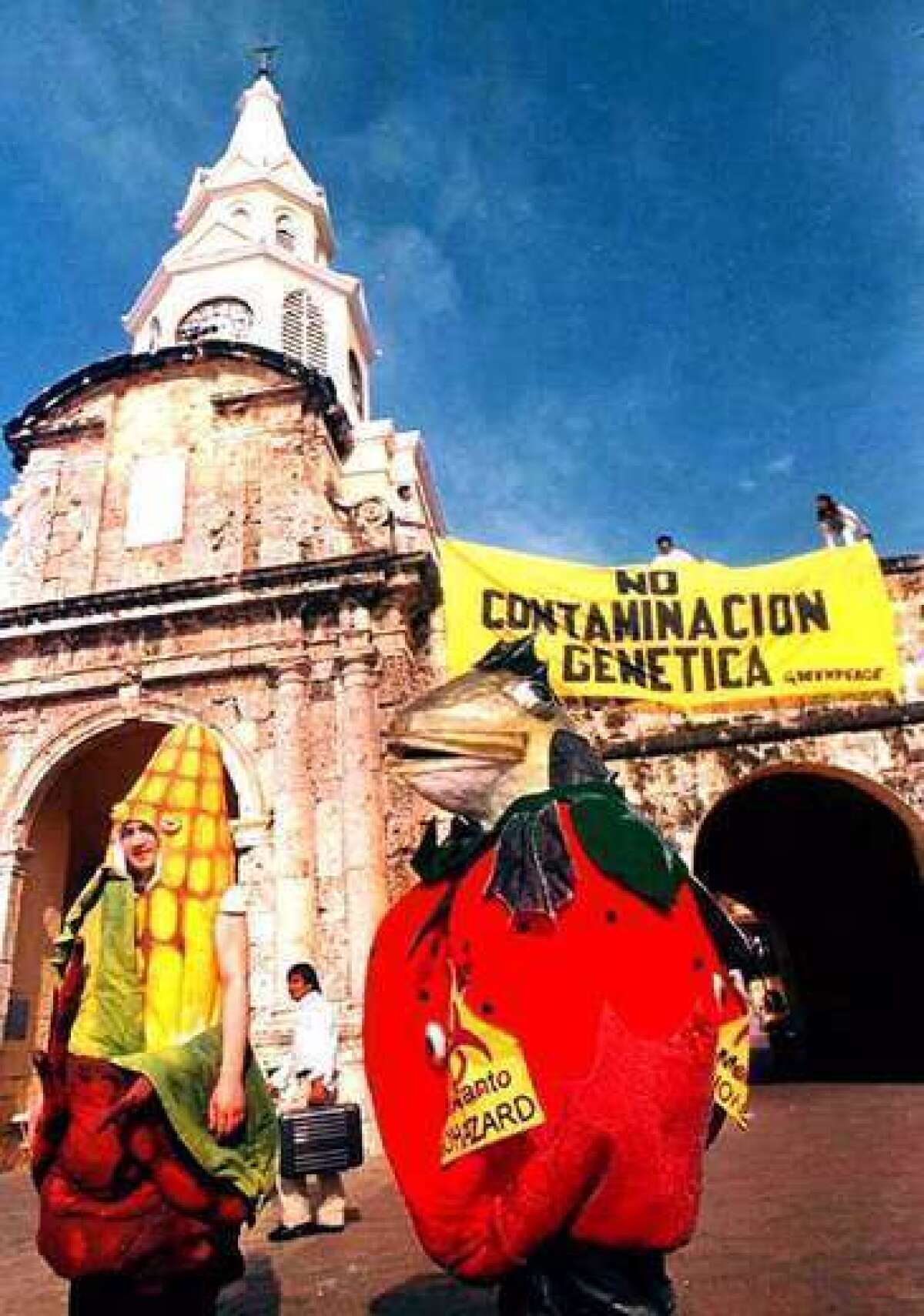Activist formerly opposed to GMOs explains his change of heart

- Share via
It’s not often that you hear someone stand up in front of a microphone and tell the world they have been wrong about a high-profile issue. But that’s exactly what Mark Lynas did last week at the Oxford Farming Conference in Oxford, England, when he renounced his long-held belief that genetically modified foods are dangerous and offered a full-throated defense of the technology as a means of feeding a growing population without devastating the environment.
“I apologize for having spent several years ripping up GM crops,” Lynas told his receptive audience on Thursday. “I am also sorry that I helped to start the anti-GM movement back in the mid 1990s, and that I thereby assisted in demonizing an important technological option which can be used to benefit the environment. As an environmentalist, and someone who believes that everyone in this world has a right to a healthy and nutritious diet of their choosing, I could not have chosen a more counter-productive path. I now regret it completely.”
Lynas is a journalist and activist whose main focus is on environmental issues. He is author of the books “Six Degrees: Our Future on a Hotter Planet” and “God Species: How the Planet Can Survive the Age of Humans.” He explained that it was his research into climate change science that forced him to confront his long-held beliefs about the dangers of GMO foods:
“I guess you’ll be wondering – what happened between 1995 and now that made me not only change my mind but come here and admit it? Well, the answer is fairly simple: I discovered science.”
Until that time, he said, his views about genetically engineered foods were shaped by a combination of several nonscientific forces, including a mistrust of big corporations, fear of unchecked technology and gut-level queasiness.
“When I first heard about Monsanto’s GM soya [soybeans] I knew exactly what I thought. Here was a big American corporation with a nasty track record, putting something new and experimental into our food without telling us. Mixing genes between species seemed to be about as unnatural as you can get – here was humankind acquiring too much technological power; something was bound to go horribly wrong. These genes would spread like some kind of living pollution. It was the stuff of nightmares.
“These fears spread like wildfire, and within a few years GM was essentially banned in Europe, and our worries were exported by NGOs like Greenpeace and Friends of the Earth to Africa, India and the rest of Asia, where GM is still banned today. This was the most successful campaign I have ever been involved with.”
To help fan those fears, Lynas said, “we employed a lot of imagery about scientists in their labs cackling demonically as they tinkered with the very building blocks of life. Hence the Frankenstein food tag.”
In his work on climate change, Lynas said he was particularly frustrated with people who refused to acknowledge that the planet was getting warmer.
“I found myself arguing constantly with people who I considered to be incorrigibly anti-science, because they wouldn’t listen to the climatologists and denied the scientific reality of climate change. So I lectured them about the value of peer-review, about the importance of scientific consensus and how the only facts that mattered were the ones published in the most distinguished scholarly journals.”
Eventually, it dawned on him that he was guilty of the very same things when it came to genetically modified foods. After writing an anti-GM article in the British newspaper the Guardian in 2008, Lynas was struck by one particular comment from a reader who questioned the logic of being opposed to genetic engineering simply because big corporations were in favor of it.
“One does not fight the corporate misdeeds of the automotive industry, for instance, by demanding that the wheel must be banned,” the commenter, writing under the alias “Fossil,” concluded.
Fossil’s words prompted Lynas to read up on the science of GMOs. “I discovered that one by one my cherished beliefs about GM turned out to be little more than green urban myths,” he said. To wit:
“I’d assumed that it would increase the use of chemicals. It turned out that pest-resistant cotton and maize needed less insecticide.
“I’d assumed that GM benefited only the big companies. It turned out that billions of dollars of benefits were accruing to farmers needing fewer inputs.
“I’d assumed that Terminator Technology [which was meant to make plants produce sterile, unusable seeds] was robbing farmers of the right to save seed. It turned out that hybrids did that long ago, and that Terminator never happened.
“I’d assumed that no one wanted GM. Actually what happened was that Bt cotton [which grows its own pesticide to fight bollworm and other pests] was pirated into India and Roundup Ready soya into Brazil because farmers were so eager to use them.
“I’d assumed that GM was dangerous. It turned out that it was safer and more precise than conventional breeding using mutagenesis for example; GM just moves a couple of genes, whereas conventional breeding mucks about with the entire genome in a trial and error way.
“But what about mixing genes between unrelated species? The fish and the tomato? Turns out viruses do that all the time, as do plants and insects and even us – it’s called gene flow.”
Most importantly, Lynas said, genetic engineering is a key tool that can help farmers feed the 10 billion people who will be living on Earth in the not-too-distant future without having to convert all the world’s rain forests into farmland. Between 1961 and 2010, he said, technologies that improved crop yields spared the need to plow an area twice the size of South America.
“There would have been no Amazon rain forest left today without this improvement in yields,” he told his Oxford audience. “Nor would there be any tigers in India or orangutans in Indonesia. That is why I don’t know why so many of those opposing the use of technology in agriculture call themselves environmentalists.”
And just for good measure, Lynas pointed out that 3 trillion meals containing genetically modified ingredients have been eaten over the last 15 years without “a single substantiated case of harm,” while dozens of people have died after eating organic crops contaminated with E. coli.
“If you look at the situation without prejudice, much of the debate, both in terms of anti-biotech and organic, is simply based on the naturalistic fallacy – the belief that natural is good, and artificial is bad. This is a fallacy because there are plenty of entirely natural poisons and ways to die. … For organic, the naturalistic fallacy is elevated into the central guiding principle for an entire movement. This is irrational and we owe it to the Earth and to our children to do better.”
Lynas has posted the full text of his speech on his website, where you can also watch it on video. The video includes 20 minutes of Q&A; with the audience.
The transcript of his talk has prompted more than 350 comments so far. Many were supportive, including this one from Oliver:
“Absolutely brilliant. I hope this speech goes viral on the internet and especially reaches more of your fellow activists from your old days. Also had my doubts first and saw Monsanto as the big evil poisoner of world population. Until I also began checking facts and reading science papers. It’s frightning [sic] to see people willingly accept ideology rather than reason. And more frightning [sic] is the fact that many of those people sit in political and administrative offices.”
And this one from Jeff:
“This is great. It inspires me to go to my local grocery store and actually seek out GM food.”
Lynas seems to have persuaded at least one person who was on the fence, Thilo:
“I’ve been leaning towards organic food and against GMO so far, but was always disturbed by the lack of scientific evidence for the supposed superiority of organic food and the supposed dangers of GMOs. You really hit the mark. I salute you for this excellent speech and your courageous about-face.”
But as is often the case in debates like these, many skeptics accused Lynas of being in Monsanto’s pocket. Here’s a post from Nat addressed to Lynas and the people who stuck up for him on the Web page:
“You are morons and shills and should be shot on contact. If you want to kill yourselves slowly, quickly, or however you wish, go for it, but you have NO RIGHT to do it to unknowing masses with your poisonous, genetically mutated monocultures that have NEVER been proven safe anywhere and have only every been tested by the chemical companies who make money selling seeds and pesticides. … May you eat what you reap.”
Read or watch the speech for yourself and make up your own mind.
Return to the Science Now blog.
Follow me on Twitter @LATkarenkaplan







